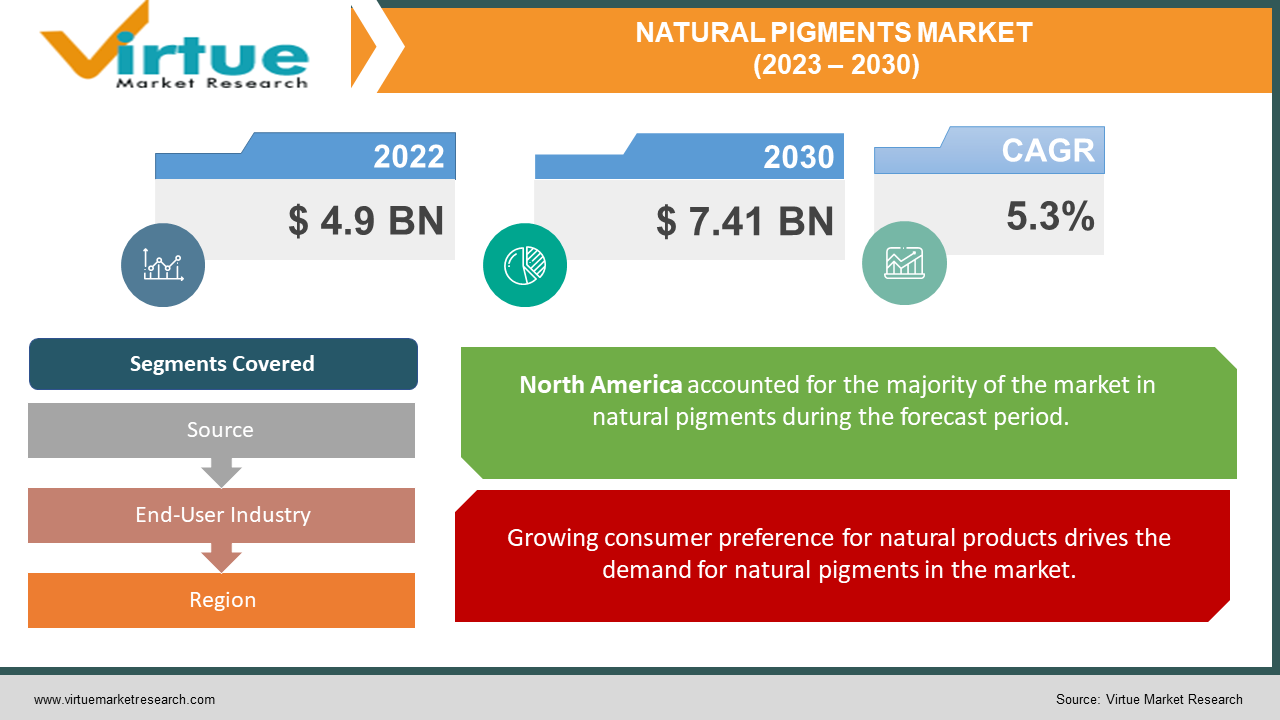Natural Pigments Market Size (2023-2030)
The Global Natural Pigments Market was estimated to be worth USD 4.9 Billion in 2022 and is anticipated to reach a value of USD 7.41 Billion by 2030, growing at a fast CAGR of 5.3% during the forecast period 2023-2030.

Natural pigments are made from natural ingredients and are used to impart colours to various materials. These pigments are derived from plants, minerals, microorganisms, and even animals and have wide applications in cosmetics, food & beverage, textiles, and others. Further, plant-based pigments are derived from herbs, vegetables, fruits, and roots such as chlorophyll give plants their green colour, anthocyanins provide red, purple, and blue hues, whereas turmeric, beetroot, and saffron give yellowish-reddish pigments. Furthermore, mineral-based pigments are derived from metals such as iron oxide gives red, brown, and yellow colour, titanium dioxide gives white pigment, and ultramarine gives blue pigment. Moreover, the major benefits of natural pigments are that they offer various shades and variations and are more eco-friendly compared to synthetic pigments. Moreover, the growing preference for natural products is fuelling the market growth for natural pigments.
Global Natural Pigments Market Drivers:
Growing consumer preference for natural products drives the demand for natural pigments in the market.
Consumers are seeking alternatives to synthetic products due to rising environmental awareness and potential health risks from harmful chemicals. Natural ingredients have a minimal impact on the environment as they are derived from renewable sources such as plant-based ingredients that release fewer toxins during the production process. Moreover, it builds trust among consumers as manufacturers incorporating natural pigments provide clear information about the products through green labelling that showcases the product’s ingredients, manufacturing process, packaging information, and others. Further, growing trends in veganism, have shifted consumer preferences towards plant-based pigment products such as in the food & beverage industry.
The rising demand for aesthetic appeal has boosted the demand for natural pigments in the market.
Natural pigments offer various colours and variations that cannot be found in synthetic pigments and offer aesthetic appeal to products in cosmetics, textiles, and art. For instance, plant-based pigments are used in manufacturing cosmetics such as natural lipsticks, moisturizers, and others. Further, mineral-based pigments offer earth tones such as red, yellow, brown, green, and others that offer extensive colour palettes to artists, interior designers, and manufacturers for creating visually appealing and aesthetic products with unique colour combinations. Further, due to their variations in shades, textures, and opacity, they are increasingly used in the textile industry, thus contributing towards sustainable fashion.
Global Natural Pigments Market Challenges:
Durability concerns can deter the market growth for natural pigments. Natural pigments derived from plant-based ingredients are prone to perishability, discolouration, and degradation over time, especially when exposed to extreme climatic conditions. This can limit the usage of natural pigments in various industries, such as food & beverage industry.
Global Natural Pigments Market Opportunities:
The Global Natural Pigments Market is anticipated to deliver lucrative opportunities for businesses, which include acquisitions, partnerships, collaborations, product launches and agreements during the forecasted period. Furthermore, the increase in demand for plant-based extracts products is predicted to develop the market for Natural pigments and enhance its future growth opportunities.
COVID-19 Impact on the Global Natural Pigments Market:
The pandemic had a significant impact on the natural pigment market. Due to the closure of cosmetics, textiles, construction and other industries, there was a decline in demand for natural pigments during the pandemic. However, natural pigments witnessed an increase in demand from the food sector as consumers preferred organic and vegan food products that provide them with a healthy diet. Additionally, e-commerce platforms witnessed an increase in demand for vegan food products containing natural pigments during the pandemic.
Global Natural Pigments Market Recent Developments:
- In May 2023, DayGlo Color Corporation launched rice protein-based powder pigment for cosmetics. The pigments are natural fluorescent pigment which is non-microplastic and formulated for clean beauty standards. Moreover, it is available in seven colours and uses 97% non-GMO renewable plant sources.
- In September 2022, Sun Chemicals launched SUNFOODS Natural Colourants. These natural colourants were meant for the food and beverage sector and can be used for food and beverage, bakery, dairy, pet food, confectionery, and others. Moreover, these colourants are extracted from algae, vegetables, and fruits.
- In August 2021, DIC Corporation partnered with a research development agreement with Debut Biotechnology Inc to develop natural pigments for food colourants and cosmetics.
NATURAL PIGMENTS MARKET REPORT COVERAGE:
|
REPORT METRIC |
DETAILS |
|
Market Size Available |
2022 - 2030 |
|
Base Year |
2022 |
|
Forecast Period |
2023 - 2030 |
|
CAGR |
5.3% |
|
Segments Covered |
By Source, End-User Industry, and Region |
|
Various Analyses Covered |
Global, Regional & Country Level Analysis, Segment-Level Analysis, DROC, PESTLE Analysis, Porter’s Five Forces Analysis, Competitive Landscape, Analyst Overview on Investment Opportunities |
|
Regional Scope |
North America, Europe, APAC, Latin America, Middle East & Africa |
|
Key Companies Profiled |
Rieco Industries Ltd, Sensient Technologies, Natural Pigments, BASF SE, Vipul Pigments, Hussain Handmade Papers Co., Veeraco Colourants Private Ltd, Earth Pigments, Koel Colours, Natural Earth Paint |
Global Natural Pigments Market Segmentation: By Source
-
Plant-Based Pigments
-
Animal-based Pigments
-
Mineral-Based Pigments
-
Microorganisms-Based Pigments
Based on market segmentation by sources, plant-based pigments occupy the highest share of the market. Natural pigments that are derived from parts of plants such as leaves, flowers, fruits, and roots offer more eco-friendliness than synthetic pigments that damage the environment by releasing toxins during the production and manufacturing process. These plant-based pigments require less processing as they possess natural colours and can be blended easily with other materials. For instance, colours derived from fruits such as berries, grapes, oranges, and others are widely used in manufacturing cosmetics. Moreover, plant-based food colour derived from vegetables and spices such as turmeric, vanilla, and saffron offers healthy eating options to consumers.
The mineral-based pigment is the fastest-growing segment during the forecast period. These are derived from minerals and earth compounds that offer diverse colour options and varieties to various industries. For instance, iron oxide offers red, brown, yellow, and black colours that are widely used in paints, coatings, and construction due to their properties such as stability and durability. Moreover, white pigment derived from titanium dioxide possesses photocatalytic properties, which makes it suitable to use in self-cleaning coatings and applications. The stability, durability, and versatility properties of mineral-based pigments make them the reliable choice of pigments in various products.
Global Natural Pigments Market Segmentation: By End-User Industry
-
Food & Beverage
-
Textile
-
Beauty & Personal Care
-
Art & Craft
-
Construction
-
Others
Based on market segmentation by the end-user industry, the food & beverage segment occupies the highest share of the market. Synthetic pigments contain harmful chemicals and additives that result in allergies and sensitivities from food products, hence natural products offer a more eco-friendly and healthy solution to consumers as they do not contain chemicals. These natural pigments are increasingly used for colouring purposes in food and beverage manufacturing such as providing vibrant and appealing, colours to confectionaries, dairy products, baked goods, snacks, beverages, sauces, and others.
The beauty and personal care segment is the fastest-growing segment during the forecast period. In comparison to synthetic pigments that contain harsh chemicals and result in skin irritations, allergies, and inflammations, natural pigments contain natural plants and minerals extracts that offer various benefits to the skin such as providing smooth and nourished skin, boosting collagen, moisturising the skin, and improves skin health. They are widely used in moisturizers, lotions, eye shadows, blushes, foundations, and lipsticks. Moreover, pigments extracted from fruits are popular in manufacturing nail polishes, lip glosses, body washes, and facewashes.
Global Natural Pigments Market Segmentation: By Region
-
North America
-
Europe
-
Asia Pacific
-
Middle East and Africa
-
South America
Based on market segmentation by region, North America occupies the highest share of the market. Increasing preference for clean and green label products and rising demand for organic food, have boosted the demand for natural pigments in the market. Manufacturers in the region are continuously making efforts in sourcing natural pigments from plant-based sources that can be used in food, cosmetics, and textiles. Additionally, stringent regulations from the US Food and Drug Administration limit the use of synthetic colourants, which have induced manufacturers to seek natural pigment alternatives for production and comply with the regulations and obtain clean product certifications, contributing to the demand for natural pigments in the region. Further, rising trends in veganism have boosted the demand for natural pigments in the food colouring industry for confectionaries and baking products such as vegan cakes, vegan pastries, vegan smoothies, and vegan pudding.
Asia-Pacific is the fastest-growing region during the forecast period. Due to the growing population, there is an increase in construction activities in the region, which has boosted the demand for sustainable colouring agents such as natural pigments in the region. Natural pigments are widely used in paints and coatings for both interior and exterior purposes. These pigments provide an aesthetically pleasing finish to homes and architectural structures along with durability and stability. These include iron-oxide-based pigments that offer earth tones and are widely used in concrete, bricks, roofing tiles, and decorative finishes.
Global Natural Pigments Market Key Players:
-
Rieco Industries Ltd
-
Sensient Technologies
-
Natural Pigments
-
BASF SE
-
Vipul Pigments
-
Hussain Handmade Papers Co.
-
Veeraco Colourants Private Ltd
-
Earth Pigments
-
Koel Colours
-
Natural Earth Paint
Chapter 1. Natural Pigments Market – Scope & Methodology
1.1 Market Segmentation
1.2 Assumptions
1.3 Research Methodology
1.4 Primary Sour
1.5 Secondary Sources
Chapter 2. Natural Pigments Market – Executive Summary
2.1 Market Size & Forecast – (2023 – 2030) ($M/$Bn)
2.2 Key Trends & Insights
2.3 COVID-19 Impact Analysis
2.3.1 Impact during 2023 – 2030
2.3.2 Impact on Supply – Demand
Chapter 3. Natural Pigments Market – Competition Scenario
3.1 Market Share Analysis
3.2 Product Benchmarking
3.3 Competitive Strategy & Development Scenario
3.4 Competitive Pricing Analysis
3.5 Supplier - Distributor Analysis
Chapter 4. Natural Pigments Market - Entry Scenario
4.1 Case Studies – Start-up/Thriving Companies
4.2 Regulatory Scenario - By Region
4.3 Customer Analysis
4.4 Porter's Five Force Model
4.4.1 Bargaining Power of Suppliers
4.4.2 Bargaining Powers of Customers
4.4.3 Threat of New Entrants
4.4.4 .Rivalry among Existing Players
4.4.5 Threat of Substitutes
Chapter 5. Natural Pigments Market - Landscape
5.1 Value Chain Analysis – Key Stakeholders Impact Analysis
5.2 Market Drivers
5.3 Market Restraints/Challenges
5.4 Market Opportunities
Chapter 6. Natural Pigments Market - By Source
6.1 Plant-Based Pigments
6.2 Animal-based Pigments
6.3 Mineral-Based Pigments
6.4 Microorganisms-Based Pigments
Chapter 7. Natural Pigments Market - By End-User Industry
7.1 Food & Beverage
7.2 Textile
7.3 Beauty & Personal Care
7.4 Art & Craft
7.5 Construction
7.6 Others
Chapter 8. Natural Pigments Market – By Region
8.1 North America
8.2 Europe
8.3 Asia-Pacific
8.4 Latin America
8.5 The Middle East
8.6 Africa
Chapter 9. Natural Pigments Market – Key players
9.1 Rieco Industries Ltd
9.2 Sensient Technologies
9.3 Natural Pigments
9.4 BASF SE
9.5 Vipul Pigments
9.6 Hussain Handmade Papers Co.
9.7 Veeraco Colourants Private Ltd
9.8 Earth Pigments
9.9 Koel Colours
9.10 Natural Earth Paint
Download Sample
Choose License Type
2500
4250
5250
6900
Frequently Asked Questions
The Global Natural Pigments Market was estimated to be worth USD 4.9 Billion in 2022 and is anticipated to reach a value of USD 7.41 Billion by 2030, growing at a fast CAGR of 5.3 % during the forecast period 2023-2030.
Growing consumer preference for natural products and Rising demand for aesthetic appeal are the market drivers for the Global Natural Pigments Market.
Plant-Based Pigments, Animal-based Pigments, Mineral-Based Pigments, and Microorganisms-Based Pigments Global Natural Pigments Market by source.
North America dominates the market for Global Natural Pigments Market.
Asia-Pacific is the fastest-growing region in the Global Natural Pigments Market.



